Gum disease is a common condition that affects millions of people. It’s caused by plaque and tartar in your mouth, which can lead to inflammation and infection in your gums. Gum disease can also lead to other serious problems, including heart disease and stroke. The good news is the majority of gum disease can be treated with simple preventative measures.
The mouth is full of bacteria that are generally harmless, but sometimes they can cause an infection.
You may be surprised to learn that there are billions of bacteria in your mouth. Most of them are harmless, but occasionally some can cause an infection.
The most common type of harmful bacteria is called Streptococcus mutans (S. mutans). These germs stick to the surface of your teeth and cause plaque, which is a film made up of bacteria and sugars that builds up on the surface of teeth over time if it’s not removed regularly by brushing or flossing. Plaque can irritate gums and lead to gingivitis, an early form of gum disease when there’s inflammation around the base of each tooth where it meets the gums. This may eventually lead to periodontitis advanced gum disease with deeper pockets between teeth where more serious infections can occur.
If these bacteria aren’t dealt with, they can make their way through the gum and into your gums.
As they do, they start to break down tissue in the mouth. This can cause your teeth to become loose or even fall out entirely. Gum disease is also linked with heart disease and stroke risk because it allows harmful substances from foods and drinks to enter your bloodstream more easily than normal, which increases inflammation in your body and may make it harder for blood vessels to function properly.
Gum disease is preventable, but it’s most common among people who smoke cigarettes or chew tobacco regularly (which causes nicotine stains on teeth). Elderly people who have lost some of their natural defenses against infection due to age-related changes in saliva flow or immune function. People with diabetes whose blood sugar levels fluctuate wildly over time, and anyone else whose diet lacks proper nutrition needed for healthy gums.
If this goes untreated for too long, it can lead to serious complications, including heart disease and stroke.
The bacteria can get into your bloodstream and infect the heart tissue. This can cause inflammation of the arteries that supply blood to your brain (ischemic stroke) or elsewhere in the body (embolic stroke).
Gum disease is also associated with an increased risk of coronary artery disease, a condition where plaque builds up on artery walls causing them to harden and narrow over time. This increases the risk of having a heart attack or dying from coronary artery disease-related complications such as arrhythmia (irregular heartbeat), angina pectoris (chest pain) or congestive heart failure.
Gum disease doesn’t just affect your gums.
It can also affect other parts of your body, including:
- Teeth: If you have gum disease, it can lead to tooth loss and other dental problems like cavities and bone loss. This is because bacteria from the mouth can enter the bloodstream and travel through the body, causing infections in organs like heart valves or kidneys (pus-filled pockets are known as purulent endocarditis).
- Jawbone (gingiva): If left untreated, severe periodontal disease may cause you to lose part of your jawbone due to infection or inflammation around its base. This condition is known as osteomyelitis.
Gum disease isn’t just an aesthetic issue, it’s a serious medical condition that needs treatment from a dentist.
It also affects other parts of your body.
If you have gum disease, it can affect other parts of your body. For example, as mentioned it’s been linked to an increased risk of heart disease and stroke.
It has also been shown to increase the chance of developing Alzheimer’s disease by up to 92%.
Gum disease has also been found to be associated with kidney failure in some people with kidney problems.
Conclusion
If you have any questions about gum disease or if you think that you may be suffering from it, please contact us. We’ll help guide you through the process of getting back on track with your oral health so that you can live a healthy life!


Recent Comments